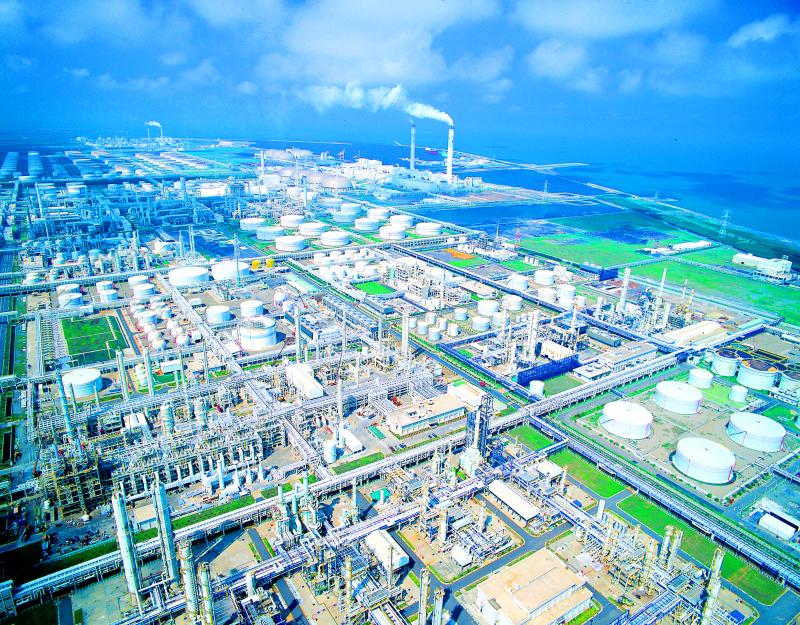Formosa Plastics Group’s (FPG, 台塑集團) four major subsidiaries yesterday posted monthly declines in revenue of more than 10 percent last month, and said the weakness would likely remain throughout this quarter as macroeconomic uncertainty continues to curb demand.
Petrochemical producer Formosa Plastics Corp (FPC, 台塑), the group’s flagship company, saw revenue tumble 16.7 percent month-on-month to NT$19.94 billion (US$664.76 million) as inflation and rising inventory in the supply chain curtailed demand for home appliances and consumer electronics, the firm said in a filing with the Taiwan Stock Exchange.
As central banks worldwide raise interest rates to rein in rising inflation, their actions have reduced disposable income and weakened purchasing power, which has in turn affected demand for FPC’s products and undercut its product prices.

Photo: Taipei Times File Photo
Prices of FPC’s products dropped 5 to 10 percent last month from June, according to its filing.
“As market demand became conservative, the company maintains its forecast for revenue in the third quarter to be lower than in the second quarter,” FPC chairman Jason Lin (林健男) said.
The firm also expects lower production this quarter as it has idled some equipment to match Formosa Petrochemical Corp’s (台塑石化) regular equipment maintenance, Lin said.
Formosa Petrochemical, the group’s oil refining subsidiary, reported that revenue last month fell 13.4 percent monthly to NT$76.59 billion due to sluggish demand for olefin products, a type of chemical that includes ethylene and propylene, and fewer refining oil shipments due to delays in shipping schedules.
The firm said that outlook for this month would improve slightly as a reduction in output by major oil producers provides support to global crude oil prices.
Nan Ya Plastics Corp (南亞塑膠), another FPG subsidiary, reported that revenue last month dropped 13 percent monthly to NT$27.97 billion, in line with the firm’s estimate.
Nan Ya attributed the decline to a significant reduction in ethylene glycol production as it aimed to narrow losses, while the company shipped less bisphenol A last month, and prices dipped from June due to excessive inventory, it said.
Revenue this month is expected to rebound slightly from last month, but revenue for this quarter would be lower than that in the previous quarter, the company said.
Formosa Chemicals and Fibre Corp (台灣化纖), another FPG subsidiary, said revenue fell 14.3 percent month-on-month to NT$31.25 billion due to drops in demand and prices.
The maker of integrated plastic and nylon products expects revenue this quarter to decline from last quarter, with shipments and prices to decline significantly, it said.

‘SWASTICAR’: Tesla CEO Elon Musk’s close association with Donald Trump has prompted opponents to brand him a ‘Nazi’ and resulted in a dramatic drop in sales Demonstrators descended on Tesla Inc dealerships across the US, and in Europe and Canada on Saturday to protest company chief Elon Musk, who has amassed extraordinary power as a top adviser to US President Donald Trump. Waving signs with messages such as “Musk is stealing our money” and “Reclaim our country,” the protests largely took place peacefully following fiery episodes of vandalism on Tesla vehicles, dealerships and other facilities in recent weeks that US officials have denounced as terrorism. Hundreds rallied on Saturday outside the Tesla dealership in Manhattan. Some blasted Musk, the world’s richest man, while others demanded the shuttering of his

ADVERSARIES: The new list includes 11 entities in China and one in Taiwan, which is a local branch of Chinese cloud computing firm Inspur Group The US added dozens of entities to a trade blacklist on Tuesday, the US Department of Commerce said, in part to disrupt Beijing’s artificial intelligence (AI) and advanced computing capabilities. The action affects 80 entities from countries including China, the United Arab Emirates and Iran, with the commerce department citing their “activities contrary to US national security and foreign policy.” Those added to the “entity list” are restricted from obtaining US items and technologies without government authorization. “We will not allow adversaries to exploit American technology to bolster their own militaries and threaten American lives,” US Secretary of Commerce Howard Lutnick said. The entities

Minister of Finance Chuang Tsui-yun (莊翠雲) yesterday told lawmakers that she “would not speculate,” but a “response plan” has been prepared in case Taiwan is targeted by US President Donald Trump’s reciprocal tariffs, which are to be announced on Wednesday next week. The Trump administration, including US Secretary of the Treasury Scott Bessent, has said that much of the proposed reciprocal tariffs would focus on the 15 countries that have the highest trade surpluses with the US. Bessent has referred to those countries as the “dirty 15,” but has not named them. Last year, Taiwan’s US$73.9 billion trade surplus with the US

Prices of gasoline and diesel products at domestic gas stations are to fall NT$0.2 and NT$0.1 per liter respectively this week, even though international crude oil prices rose last week, CPC Corp, Taiwan (台灣中油) and Formosa Petrochemical Corp (台塑石化) said yesterday. International crude oil prices continued rising last week, as the US Energy Information Administration reported a larger-than-expected drop in US commercial crude oil inventories, CPC said in a statement. Based on the company’s floating oil price formula, the cost of crude oil rose 2.38 percent last week from a week earlier, it said. News that US President Donald Trump plans a “secondary